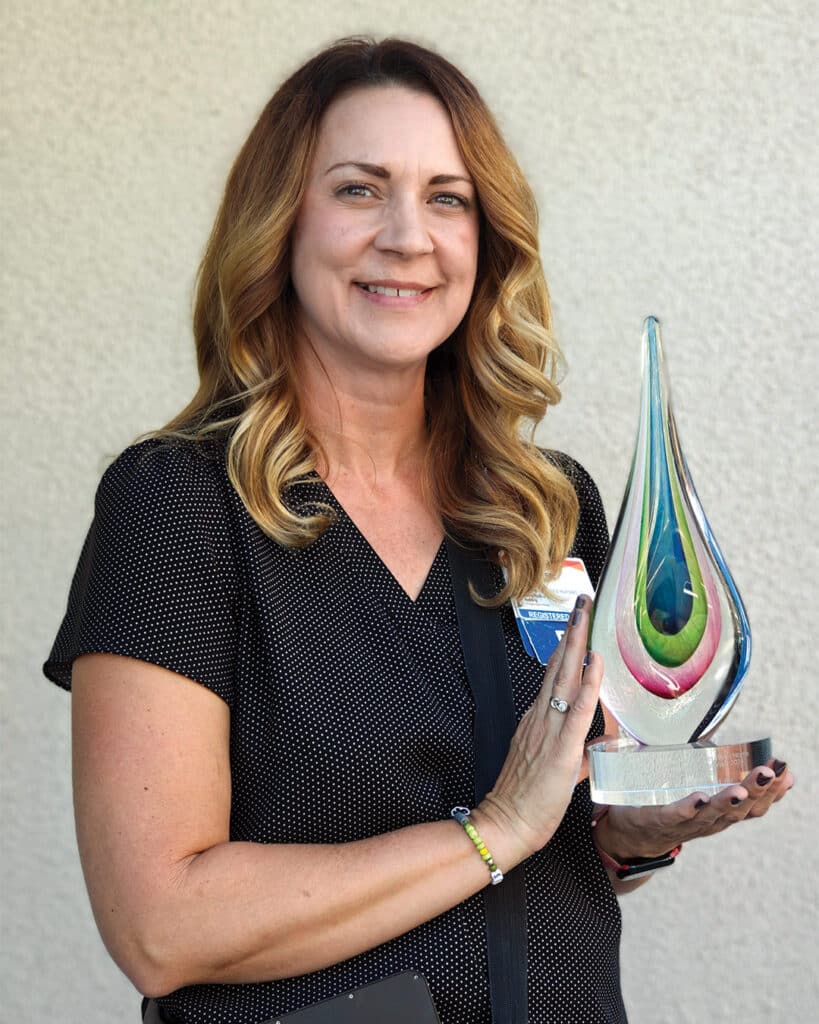Care with Compassion
Providing Comfort with Mercy Hospice…
To most, the mention of hospice sends chills down the spine. We cringe, engulfed in visions of death and dying, of pain and loss. Few wish to go there. But those few, those gifted souls who dedicate their lives to ushering their patients’ exits from this existence, do go there, to hospitals, assisted-living communities and people’s homes, to provide comfort in the final months of a life.
To them, hospice isn’t about dying. Hospice is living.
Hospice is a team of workers ranging from professional to volunteer. Hospice doctors order patient care and hospice nurses manage that care. Hospice social workers and hospice chaplains counsel patients, whether to facilitate last words between them and their loved ones or to spiritually fortify a patient to face the impending unknown. Hospice volunteers fill in, ensuring continuity of care.

Kristin Duarte, supervisor of hospice services for Dignity Health, manages two hospice teams, one in Redding and one in Red Bluff. She says public misconceptions about hospice can affect the quality of care. “People are fearful that the medications that are often used in hospice will hasten death,” she says. “We aren’t there to help people die. We come to help people live to the best of their ability, the best quality possible for whatever time they have left.”
Her fear is that this causes people to put off calling for hospice services until it’s too late to provide all that hospice has to offer, including the possibly of saving a patient. “The criteria to qualify for hospice is if this disease takes its natural course without aggressive treatment, this patient would likely die in six months or less, and we rarely receive referrals for patients early,” she says. “Patients are sometimes robbed because of late referrals to hospice. People can actually revoke their hospice care if they’re improving.”
Duarte estimates between 8 and 10 percent of their patients each year graduate from hospice. Those patients continue with their lives.
Dawn Reich, manager of clinical services, says the goal of hospice is to build a relationship with the patient and loved ones. “That very first visit can be very intense. You may not go over everything,” she says. “There are subsequent visits to reinforce and go over other things that weren’t covered in that that first visit, and the trust is built.” She adds that a single nurse can make between 20-30 hospice visits a week, depending on patients’ needs and how far apart they live.
One of Reich’s nurses is April Forward, a registered nurse who is hospice palliative certification credentialed. Forward, a field nurse, recently won the Dignity Health Caregiver of the Year 2024 award, commemorated by a glass trophy shaped like a tear with outlines of more tears inside, accented in colors. She feels in hospice she has found her niche in life.

“A person’s final time in life is as important as the beginning of their life,” she says. “It’s important to me to honor the patient, advocate for what’s important to them, to help validate the feelings of the whole family, including the spouses, the kids, grandkids. It’s about being there for that person, to bear witness to their final journey. And I truly feel it’s a sacred thing.”
Reich sees Forward as one of those few for whom hospice work is a calling. “Her families love her. She goes above and beyond for each and every one of them,” she says. “She makes sure all of her loose ends are tied. Nothing’s left undone, and if she gets a message or a call when she’s off, she makes sure that somebody follows up with that. She just embodies what hospice is. She embodies what a being a hospice nurse is.”
Amy Silberstein has been a volunteer for her entire adult life, beginning as a crisis counselor in 2011. She says someone saw her work and suggested she try working as a hospice volunteer. At first, she visited homes to give the primary caregivers respite, sitting with the patient and family in their stead.
Today, she works bereavement follow-up from her home, phoning the loved ones of recently passed patients to determine whether they want continued support. She informs them of options Dignity Health hospice offers, such as grief and loss support classes. She calls them back every four to six weeks, for up to 13 months, to see how they are coming along.
Focusing on mourners’ needs in this way can send out significant ripples. Supervisor Duarte says she was in her mid-20s, undecided what direction to take her career, when her stepmother neared the end a two-year struggle with ovarian cancer. “I had really not heard much about hospice prior to that, but I saw what hospice did for my stepmom and for my dad, the difference that they made,” she says. “And I decided I had to be a part of it.”
It was the relationship, fostered by hospice workers between the patient and loved ones, that directed Duarte to a new life. And she had served as Dignity Health supervisor of hospice services for more than 10 years, managing the full spectrum hospice services, when came the next time she needed support. Her father contracted terminal cancer.
“I was able to thank him for everything he’d done for my siblings and I, and our growing up,” she says. “I don’t know that I would have been able to have those conversations had I not had the experience that I’ve had working in hospice. So I feel there was nothing left unsaid between my dad and I when he died.” •
Dignity Health • Mercy Medical Center Redding
1544 Market St., Redding • (530) 245-4070
www.dignityhealth.org/north-state/locations/mercy-redding/services/hospice
www.commonspirit.org • Find them on Facebook




